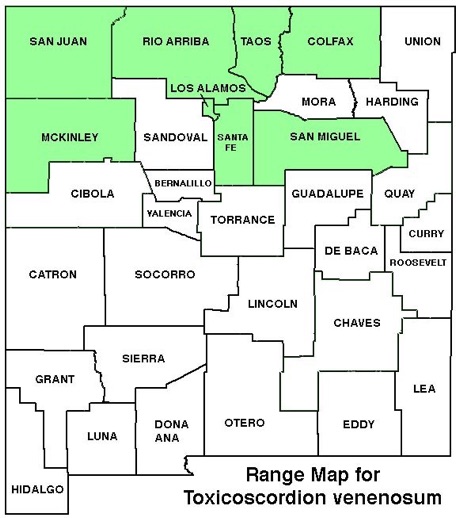WILDFLOWERS OF NEW MEXICO

Pointed cylindrical to dense pyramidal clusters of small white flowers grow on stems 6–18 inches tall, and numerous grass-like basal leaves sprout from a bulb. Note the flowers bloom from the bottom up the stem, and petals have an oval, yellow-greenish, oval basal spot. Also called Grassy Death Camas. The bulb and seeds are deadly poisonous.
FLOWER: April–June. Cylindrical clusters (panicles) with short branching stems (var. gramineus), or pyramid-shaped clusters (racemes) on short unbranching stems (var. venenosus); flowers to 3/8-inch wide (10 mm), with 6 petals (tepals) in 2 rows, each with a yellowish-green, oval to semicircular basal gland. The bases of the inner petals abruptly narrow into a “claw.”
LEAVES: Basal from bulb. Blades grass-like, 4–16-inches long (10–40 cm), 1/8–3/8-inch wide (4–10 mm). Stem leaves alternate, much smaller.
HABITAT: Dry, sandy, rocky soils, meadows, grasslands; prairies, sagebrush, pinyon-juniper, ponderosa pine-Douglas fir forests.
ELEVATION: 5,500–7,400 feet.
RANGE: AZ, CA, CO, NM, UT; all Rocky Mt. states and west.
SIMILAR SPECIES: NM has var. gramineus, usually with outer tepals without claws; var. venenosus usually has clawed outer tepals. Foothills Death Camas, T. paniculatum, in much the same range, has leaves to 9/16-inch wide (15 mm), and cylindrical bloom clusters (panicles) to 8-inches long (20 cm) with flowers on short, branching stems; the outer petals do not narrow to form a claw. Note that variations within these two species overlap and can make a positive identification difficult. The characteristics of the photos tend toward T. venenosum, but fall within the range of T. paniculatum. The petals of the related species Death Chamas, Anticlea elegans, usually at higher elevations, have heart-shaped basal spots.
NM COUNTIES: Northern NM in mid-elevation, moist habitats: Colfax, Los Alamos, McKinley, Rio Arriba, San Juan, San Miguel, Santa Fe, Taos.









MEADOW DEATH CAMAS
TOXICOSCORDION VENENOSUM VAR. GRAMINEUS (Zigadenus venenosus)
Death Camas Family, Melanthiaceae (formerly in Lily Family, Liliaceae)
Perennial herb from bulb


















THE CONTENTS OF THIS WEBSITE ARE COPYRIGHTED AND CANNOT BE USED
WITHOUT PERMISSION OF GEORGE OXFORD MILLER








The three petals (tepals) on the inner row narrow abruptly at the base to form a “claw” (arrow).


















EMAIL ME







